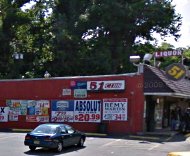5/7/2012
Maryland Court Rules Against Parking Ticket FriskingMaryland Court of Special Appeals rules double-parking is not a crime.

Police were wrong to frisk a motorist over a parking infraction, Maryland's second highest court ruled last month. A three-judge panel considered case of Bruce Wayne Gilmore, who had backed into a parking spot at the 51 Club liquor store in Temple Hills on February 7, 2008.
Corporal Derrick Neumer of the Prince George's County Police Department had been watching the lot, on the lookout to make a drug bust. Noticing Gilmore's car was parked slightly over the line, Neumer pounced as Gilmore returned from the store.
"Why did you park your car like that?" Officer Neumer asked.
"I didn't realize it was parked that way," Gilmore responded.
Neumer asked for Gilmore's license and registration so he could run a records check. As he did so, he claimed that Gilmore appeared to be nervous, placing both hands in his pockets. Neumer declared that for "officer safety" he would have to conduct a pat-down search. Neumer found a pocket knife and a bag of marijuana in a jacket pocket. Another pocket contained crack cocaine. Neumer never actually wrote a parking ticket for the alleged offense. At trial, Gilmore's attorney pointed out that his client had, in fact, broken no motoring law.
"There is no ordinance or citation in the parking citations [section of the law] on what is a parking violation that indicates that parking in more than one spot is a violation of any parking ordinance," the attorney argued. "In fact, Maryland Code 21-1003 delineates every single parking type of violation, from stop and standing parking that is prohibited, and no place within the regulation is parking in more than one spot enumerated."
The trial judge ruled that he believed the officer had reasonable suspicion and upheld the search and seizure. Gilmore challenged the decision, and the Maryland Court of Special Appeals agreed that the prosecution had no case.
"The state cannot point to a provision of law that clearly prohibits the manner in which appellant operated and parked his vehicle," Judge Timothy E. Meredith wrote for the three-judge panel. "Corporal Neumer used the phrase 'double parking' to describe the parking violation he witnessed, but was unable to identify the provision in the code that prohibits occupying two spaces. Nor was the prosecutor who represented the state at the suppression hearing able to cite a provision that prohibits occupying two spaces."
Maryland does apply all vehicle code restrictions to private parking lots that are open for the general use of the public, but the appellate court found no crime had been committed. The judges next turned to the question of whether the police officer was justified in detaining Gilmore in the parking lot.
"Our review of cases from other jurisdictions persuades us that a mistake of law -- unlike a mistake of fact -- cannot support a detention for a purported traffic violation," Meredith ruled. "In the present case, the officer who detained appellant in the parking lot did so under the mistaken belief that there was a statutory provision which made it illegal to park one's vehicle straddling a line on the pavement. That was a mistake of law. Because a lawful detention cannot be predicated upon a mistake of law, the evidence obtained during the ensuing encounter should have been suppressed."
The judges reversed Gilmore's conviction and ordered the county to pay all court costs. A copy of the decision is available in a 65k PDF file at the source link below.


